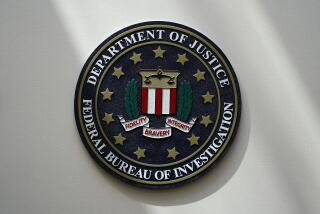U.S. Accuses British Man of Terrorist Conspiracy
WASHINGTON — A terrorism suspect arrested in Britain this week was in Internet contact with a U.S. Navy reservist and had detailed information about the sailor’s San Diego-based battleship carrier group, including its classified travel plans and its vulnerability to attack, British and American prosecutors said Friday.
Babar Ahmad, a 30-year-old college employee arrested by British authorities Thursday, was described as a cousin of suspected Al Qaeda member Mohammed Naeem Noor Khan -- whose recent arrest in Pakistan triggered a spate of terrorism alerts last weekend in New York, New Jersey and Washington.
Ahmad appeared in a London court Friday as U.S. prosecutors seeking to extradite him unveiled charges that also described him as a fundraiser and propagandist for the Taliban and for Muslim separatist fighters in Chechnya. He faces a possible life prison term if convicted in the United States.
Ahmad was arrested at the request of U.S. prosecutors on charges that include conspiracy to fund terrorists, conspiracy to support the Taliban, soliciting violent crime and conspiracy to launder money for terrorists who are planning murder.
The detailed plans on the U.S. naval group dated to early 2001 and never resulted in an attack. British police found a floppy disk at the London home of Ahmad’s parents that contained a document discussing the U.S. aircraft carrier Constellation and its battle group -- with details on its companion ships, the specifications and assignments of each ship, their movements and a drawing of the group’s formation, according to an arrest warrant issued in Hartford, Conn., by U.S. Atty. Kevin O’Connor.
The information noted that the battle group, which at that time was assigned to enforce sanctions against Iraq and undertake operations against Al Qaeda and Afghanistan’s Taliban government, was scheduled to pass through the narrow Strait of Hormuz, off the coast of the United Arab Emirates, on April 29, 2001, according to the warrant. Navy officials confirmed to U.S. prosecutors that the battle group’s plans in Ahmad’s possession, which were classified at the time, were accurate.
“They have nothing to stop a small craft with RPG [rocket-propelled grenades] etc., except their Seals’ stinger missiles,” an entry on the document, possibly an e-mail message, said. It ended, “Please destroy this message.”
The file was last modified April 12, 2001, six months after the Oct. 12, 2000, attack on the U.S. destroyer Cole by a small boat bearing explosives.
It was unclear whether the computer file was an e-mail message from an unnamed Navy reservist on active duty in the Middle East, now retired, who was then stationed on the U.S. destroyer Benfold, part of the Constellation battle group.
However, a man describing himself as a sympathetic enlisted sailor on the Benfold exchanged a number of e-mail messages with a jihadist Internet site called Azzam Publications, which investigators say was operated by Ahmad. In one message, the man praised the attack against the “American enemies” on the Cole and voiced support for “the men who have brought honor this week ... in the lands of jihad Afghanistan, Bosnia, Chechnya, etc.”
Federal investigators in the Immigration and Customs Enforcement division of the Department of Homeland Security and the Naval Criminal Investigative Service are continuing to investigate the former sailor, who has not been charged.
“Obviously, he’s a central figure at this point, and we’re continuing to investigate,” O’Connor said in an interview. “And if appropriate, we would bring charges. At this point, we’re still actively investigating the matter.”
One reason the retired sailor has not been charged with conspiracy is that investigators have not directly tied him to the e-mail exchanges, a senior military official said Friday on condition of anonymity.
“We haven’t arrested him,” the official said. “We have no tie to the data that was found on the Constellation battle group now.”
Evidence offered by federal prosecutors in Connecticut indicated that Ahmad had ties to Chechen rebel leader Shamil Basayev, who has claimed responsibility for attacks on Russian civilians, including the 2002 Moscow theater siege.
U.S. officials confirmed that Ahmad is a cousin of Khan, the Pakistan-based computer specialist arrested last month on suspicion of sending coded messages to a vast network of Al Qaeda operatives. One U.S. official who declined to be identified said authorities in the United States, Pakistan and Britain still were investigating the exact nature of the relationship between the two men to determine whether they were involved in any plot unfolding in Britain or the United States.
Ahmad’s arrest was one of several in a multinational sweep as authorities cooperate in rounding up suspected terrorists and their supporters. A second U.S. official said authorities in Pakistan and Britain were continuing to make arrests.
“Obviously, there is a lot going on,” the official said.
U.S. officials raised the terrorism alerts last weekend when information from computer data seized after Khan’s arrest, much of it old, indicated terrorists had focused on five U.S. buildings for possible attacks. Senior Homeland Security Department officials said Friday that computer files on all five sites -- in New York, Newark, N.J., and Washington -- had been accessed as recently as January.
“These were five targets they were looking at, and they were accessing information about all of them,” an official said.
Earlier Friday, an official said fresh surveillance photographs had been taken of the Prudential Financial headquarters in Newark. That report was later discounted.
In connection with Ahmad’s arrest, investigators continue to investigate a number of people in the United States who allegedly conspired with him to fund Islamic militants, according to the charges. During the probe, federal agents raided the New Jersey home of an unnamed administrator for one of the duplicate websites for Azzam Publications, and found phone numbers for Ahmad and Azzam, according to the affidavit.
Federal prosecutors in Connecticut are handling the Ahmad case because a website that he allegedly operated was run through a Trumbull, Conn.-based Internet service-provider from 1999 until 2001.
Ahmad is expected to challenge extradition to the United States, a process that is likely to take months, O’Connor said. Once here, his case would be submitted to a federal grand jury.
In a move preceding extradition, Ahmad was charged Friday with offenses under Britain’s Terrorism Act and ordered held for a week. Tall, dark and bearded, he wore a T-shirt and casual slacks at his London court appearance. Ahmad told Judge Christopher Pratt, when asked if he understood the charges, “Not really. I’m a bit confused.”
He was first arrested on terrorist charges in December in his South London home, but released a week later. Police rearrested him Thursday evening at his workplace in the mechanical engineering department of London’s Imperial College.
Prosecutors in the United States and Britain allege that Ahmad recruited fighters and solicited money and weapons for rebel fighters in Afghanistan and even scrounged hand warmers for anti-Russian guerrillas in Chechnya. He is accused of advising fighters and fundraisers how to travel clandestinely to those countries.
The British prosecutor told the court that Ahmad had extensive international contacts and possessed several false documents and used a number of aliases that enabled him to travel in and out of Britain with ease.
Ahmad’s lawyer, Caroline Guiloff, said that Ahmad was an educated professional with no prior convictions who had lived in Britain all his life.
Ahmad’s sister, who withheld her name, complained in a local Muslim newspaper that the charges were “all lies.”
“There is no proof of his involvement in terrorism,” she said.
Outside the court, another of Ahmad’s defense team, Mudassar Arani, complained that Britain was funneling suspects accused with insufficient evidence to the United States. “It appears that anybody who is arrested in this country for terrorism offenses, when there’s not sufficient evidence to prosecute ... those individuals’ extraditions are being sought by America,” Arani said. Ahmad is to appear in court again Friday.
*
Times staff writers Josh Meyer in Washington and Janet Stobart in London contributed to this report.
More to Read
Sign up for Essential California
The most important California stories and recommendations in your inbox every morning.
You may occasionally receive promotional content from the Los Angeles Times.










